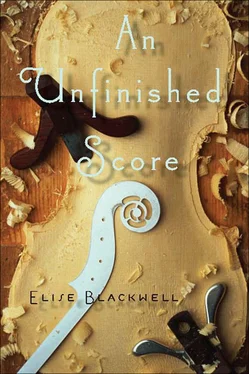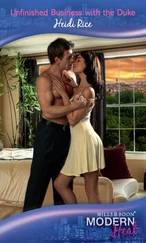Though Suzanne never wears black offstage, not since she was twenty, today only the left side of her closet feels possible. She finds black pants that are not too dressy and a black silk tee usually worn under a shimmering sweater at a winter concert. She knows Petra will ask her what the hell is going on, but she cannot help herself. She tries to dress the clothes down with boots, with dangling silver earrings, with a face scrubbed clean.
When the phone rings, she answers it. A woman’s voice says her name, more statement than question.
Suzanne repeats her own name. “Yes, this is Suzanne.”
“Suzanne, you owe me a great deal.” This is said so softly that Suzanne can hardly hear it. The woman hangs up, or maybe they are disconnected. Suzanne stands with the phone in her trembling hand, mouth growing dry until she breaks the frozen moment.
She knows a phone call can change your life. It was a ringing phone that brought her into the quartet. When Petra called with the invitation, Suzanne had been mulling over the possibility of resigning her seat in St. Louis and moving to a place where Ben would be happier and perhaps have more opportunity. Without first identifying herself, Petra greeted Suzanne, as usual, with a viola joke: “How do I keep my violin from being stolen?”
Suzanne delivered the tired punch line for her: “Put it in a viola case.”
“But this time, I actually need a viola,” Petra said. “I told them we’d probably have to get someone else now that you’re rich and famous, but I have to ask.” She told Suzanne that Anthony, a classmate from Curtis, was starting a quartet in Princeton, that he’d married a woman with family money willing to float the ensemble for two years, that he had a serious business plan, that their friend Daniel had already committed. “Not that you’d be interested, not with your job, but there’s no one Daniel and I would rather have. Anthony’s still such an asshole, but we’d have him outnumbered. Plus there’d be more stuff for Ben to do — an hour from New York and Philadelphia.”
“That already crossed my mind,” Suzanne answered.
“Your dad still lives in Philly, right?” Petra paused. “Or maybe I shouldn’t have reminded you of that.”
“It’s okay,” Suzanne said and asked if Petra thought working with Daniel would be all right, given his propensity to fall in love with whomever he played with.
“Suz?” Petra paused again — a long silence. “I really need you. With Adele. I’m failing as a single mother. There are problems. I need help.”
For four days, Suzanne kept Petra’s call to herself, knowing Ben would make the decision if she told him while she was still undecided. If it wasn’t her decision, she might hate him forever. So she decided on her own, and then she told him. She resigned her chair, with apologies, helping to arrange the auditions for the lucky player who would replace her, trying not to care who it was. She, Ben, and Petra emptied their penny jars and made an offer on the cheapest house for sale in Princeton. By the time Alex conducted her in Harold in Italy , it was too late to stop, and Suzanne’s life changed again.
Anthony did indeed have money, and he had a solid plan. Suzanne, Petra, and Daniel committed to stay with the quartet for at least two years and to accept no other work that would interfere with the quartet’s schedule — no playing in other ensembles, no session work in season, no solo performances without an okay. The contract each signed was so fastidiously crafted as to include practice schedules. In exchange, each would receive a modest but reliable salary. At the end of two years, the salaries would stop. If the quartet was not yet solvent through a combination of grant money, donations, CD sales, and performance income, it would dissolve. “It’s a business,” Anthony said when they gathered to sign the papers in the presence of his wife’s family lawyer.
“It’s a job,” said Daniel.
Anthony watched him. “No drinking before practice or performance. I put it in the contract, so make sure you read what you’re signing.”
Petra put a long arm around Suzanne’s shoulders. “Don’t worry,” she whispered. “It’s music, too.”
At the end of two years, the quartet was solvent, if barely, and after four, its members’ earnings are just about what they were when they received salaries — sometimes a little more.
Now Suzanne risks arriving late, and they all promised never to be late. She walks fast to stop her shaking, but she thinks about the voice coming through the receiver, the voice entering her ear without permission: Suzanne, you owe me a great deal .
The practice room of the Princeton Quartet is almost subterranean, its only natural light coming from the long horizontal windows just below the ceiling, the rectangles that show only the moving shoes of passing students, often shoes of a kind and quality that Suzanne still never splurges on and could never have owned while in school. When she notes this, she recognizes the old bitterness of want and reminds herself that she does not have to work in an office or, like her mother, try to sell starter homes on the side in an effort to make something better. Suzanne plies her art for a living. She is a musician, which is what she has always wanted to be.
She drops the last step both feet at once and stands in the open doorway. Petra faces a far corner, jumping up and down with her hands in the air, still getting her jangles out. Daniel hunches his six feet three inches over his cello, his glossy head sagging. To someone who doesn’t know him, he might look relaxed, but Suzanne knows before she looks that his right hand is tense with his bow, his pinky finger rigid. He looks up at her, his face softening as though he is seeing her for the first time after a long absence. Suzanne worries that the crush that has wavered from her to Petra to her to Petra to her and most recently back to Petra is about to alternate again.
Though they joke about it, it really isn’t funny, and Suzanne feels too tired for it, for the delicacy and compassion it requires of her. Yet sometimes she wishes that she had fallen in love with Daniel, who lets his passion guide his choices and who lucked into the best halves of his Manchurian father and Canadian mother. He’s dark and tall, made sensual by large eyes and curving lips. With Daniel, she never feels as though she has said the wrong thing and is being judged for it. With Daniel, she almost always knows what he’s thinking and how he’s feeling. With Daniel, she never feels as though she is alone in the room and he is far away.
Suzanne is staring at him when Petra, without looking around from the corner she faces, asks why the viola players were found standing outside the party. She spins around to deliver the punch line before Suzanne can. Instead she freezes and says, “You’re wearing black. What the hell is going on?”
Daniel meets Suzanne’s eyes. “You look beautiful in black.”
“We’re almost late,” Anthony says, closing the door. “Two minutes.”
Handsome but effete, with a flourish of freckles high on his cheeks and forehead, Anthony is, as ever, well-dressed above the ugly tasseled loafers he was partial to even as a student. His pants hike as he sits, exposing two inches of extravagantly thin sock — an effect Suzanne suspects is planned.
Suzanne takes her seat. Now there is nothing but the familiar smell of wood and rosin, the sound of string being slackened and tightened, the asymmetrical weight of the bow in her right hand, the familiar plate of the chin rest, still cool under her jaw.
Playing chamber music involves an intimacy between people that is no weaker than the closeness of love or sex. To play with others is to be bound by and respond to their rhythms and desires without sacrificing your own. Like sex, great music can be made with someone you know well or not at all — and with someone you loathe so long as there is passion in your hatred. Yet, unlike sex, great music can be made even with someone you merely dislike. This explains why Petra, Daniel, and Suzanne play well with Anthony, even when they find his arrangements too facile. There is some other, unnamable sensibility they share.
Читать дальше












